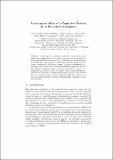Learning an atlas of a cognitive process in its functional geometry
Author(s)
Langs, Georg; Lashkari, Danial; Sweet, Andrew Douglas; Tie, Yanmei; Rigolo, Laura; Golby, Alexandra J.; Golland, Polina; ... Show more Show less
DownloadGolland_Learning an atlas.pdf (4.407Mb)
OPEN_ACCESS_POLICY
Open Access Policy
Creative Commons Attribution-Noncommercial-Share Alike
Terms of use
Metadata
Show full item recordAbstract
In this paper we construct an atlas that captures functional characteristics of a cognitive process from a population of individuals. The functional connectivity is encoded in a low-dimensional embedding space derived from a diffusion process on a graph that represents correlations of fMRI time courses. The atlas is represented by a common prior distribution for the embedded fMRI signals of all subjects. The atlas is not directly coupled to the anatomical space, and can represent functional networks that are variable in their spatial distribution. We derive an algorithm for fitting this generative model to the observed data in a population. Our results in a language fMRI study demonstrate that the method identifies coherent and functionally equivalent regions across subjects.
Description
Proceedings of the 22nd International Conference, IPMI 2011, Kloster Irsee, Germany, July 3-8, 2011.
Date issued
2011-06Department
Massachusetts Institute of Technology. Computer Science and Artificial Intelligence Laboratory; Massachusetts Institute of Technology. Department of Electrical Engineering and Computer ScienceJournal
Information Processing in Medical Imaging
Publisher
Springer-Verlag
Citation
Langs, Georg et al. “Learning an Atlas of a Cognitive Process in Its Functional Geometry.” Information Processing in Medical Imaging. Ed. Gábor Székely & Horst K. Hahn. LNCS, Vol. 6801. Berlin, Heidelberg: Springer Berlin Heidelberg, 2011. 135-146.
Version: Author's final manuscript
ISSN
978-3-642-22091-3
0302-9743
1611-3349
